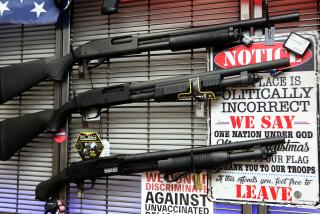Assault Rifles Are Not Heavily Used in Crimes
- Share via
After a deranged drifter armed with an “assault” rifle turned a Stockton schoolyard into a killing ground in 1989, California became the first state to outlaw many such weapons.
Lawmakers and law enforcement officials warned that the public was endangered by the rising number of criminals armed with Uzis, MAC-10s and Rambo-style AK-47 rifles.
But records show that the use of assault weapons to commit crimes is dwarfed by less exotic firearms.
“These kinds of guns don’t play a large role in violent crime and they never have,” said Steve Helsely, assistant director of the state’s Division of Law Enforcement.
Of the fatal shootings investigated by the Los Angeles Police Department’s South Bureau homicide unit in 1990 and 1991, less than 2% involved assault weapons, records show.
Similarly, of 341 gang-related, fatal shootings handled by the Los Angeles County Sheriff’s Department in 1990 and 1991, 28 were committed with assault weapons.
“The fact,” said Sgt. Wes McBride, a sheriff’s gang expert, “is that for all the stink and hoopla and wheel-spinning that’s gone on, (assault weapons) are not a problem in the gang world.”
Nor are assault weapons prevalent among drug dealers, Helsely said.
Of 1,979 guns seized in 1990 by state narcotics agents, he said, only 58 are on California’s list of banned assault weapons.
In Orange County, six of 199 guns examined by the sheriff’s crime lab were assault weapons, according to documents obtained by The Times. In Huntington Beach, seven of 264 firearms examined in 1990 by that city’s crime lab were found to be on the list of banned weapons.
In San Diego, police analysts logged two assault weapons among the 127 guns they examined in 1990, documents show.
The firearm of choice among criminals in Los Angeles, police say, is the 9-millimeter, semiautomatic pistol--the same firearm preferred by many law enforcement officers. The pistols are more easily concealed and are not banned.
Opponents of the assault weapon ban contend it is little more than an ill-conceived effort to promote broader gun control in California.
“What’s the difference between my (assault rifle) and another sportsman’s Maserati?,” demanded Corona insurance broker Michael McNulty, among the most outspoken critics of the assault weapons ban. “The whole impetus for this thing was purely emotional. It has no basis in fact.”
Support for a ban on assault weapons mushroomed after the Stockton schoolyard incident, in which Patrick Purdy killed five students and wounded 29 others before shooting himself to death. Purdy did his killing with a semiautomatic rifle modeled after the fully automatic AK-47.
The episode prompted then-state Atty. Gen. John K. Van de Kamp to tote an AK-47-style rifle before the California Assembly and heatedly denounced such weapons, which can fire 30 or more high-velocity bullets within seconds and be swiftly reloaded.
“These weapons have got to go,” LAPD Chief Daryl F. Gates said while testifying before a U.S. Senate panel. “Police all over America are united on this.”
The new law banned nearly 60 types of rifles, pistols and shotguns while requiring people who already owned such weapons to register them for $20 each.
But the law, critics charge, was unenforceable. Some guns were outlawed while virtually identical firearms remained legal. The confusion over what constituted an assault rifle caused the attorney general to extend the registration period through March of this year while the law was clarified.
State officials projected that registration fees would largely pay for the $4.5-million program.
But no more than about 70,000 of the estimated 300,000 to 600,000 assault rifles in California have been registered--generating less than $1 million in revenue.
Department of Justice officials say there is no way to quantify how much the law has helped reduce crime, if at all.
“It is not a cure-all . . . and no one ever suggested that it was,” said David Puglia, a spokesman for Atty. Gen. Dan Lungren.
Some legislators who initially supported the ban have begun to question whether the effort was worth depriving law-abiding citizens of the right to own assault weapons.
“Gun owners are being over-assessed. . . .,” said state Sen. Robert Presley (D-Riverside), a former undersheriff.
Still, many continue to endorse the ban.
Van de Kamp said: “We need to do everything we can to reduce violence in the state.”
More to Read
Sign up for Essential California
The most important California stories and recommendations in your inbox every morning.
You may occasionally receive promotional content from the Los Angeles Times.










